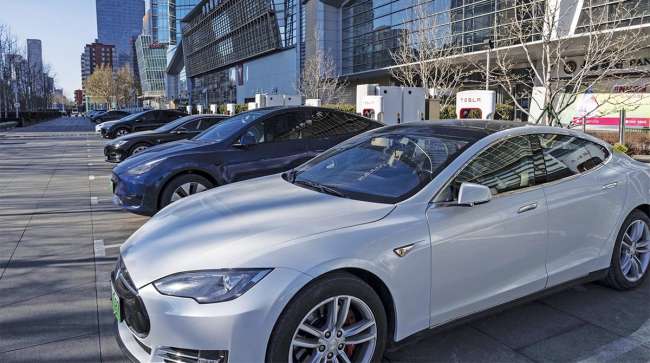Bloomberg News
Waning EV Market Drags Down Chipmakers’ Shares

[Stay on top of transportation news: Get TTNews in your inbox.]
A waning electric vehicle market is dragging down shares of companies making chips for automobiles, with their limited exposure to AI excluding them from a broader rally. But analysts are urging long-term investors to keep the faith.
Infineon Technologies AG and STMicroelectronics NV, two bellwethers of the automotive chip industry, are each down more than 18% in 2024, placing them among the worst-performing tech stocks in Europe. U.S.-listed NXP Semiconductors NV and Texas Instruments Inc. have lagged gains in the Philadelphia Semiconductor Index.
Signs of weaker EV demand are piling up, evidenced by shockingly low sales figures at Tesla Inc. Rising inventories and competition from Chinese chipmakers have added to the gloom. Still, bulls are mostly undeterred — Infineon and STMicro have only one sell recommendation between them.
“We think they will weather the storm in the near term,” said Morningstar Inc. analyst Brian Colello, who rates both stocks as buy. “We think it’s a good entry point if you’re willing to hold these names for two to five years’ stretch.”
Infineon Technologies AG is down more than 18% this year. (Chris Ratcliffe/ Bloomberg News)
The number of chips used in cars has seen a sharp rise as automakers adopt electric motors and autonomous driving features. That growth is seen continuing as EVs become increasingly sophisticated, with Bernstein analysts forecasting chip content per car to go from $650 in 2021 to more than $1,500 by 2031.
China poses a potential risk in terms of competition. Bloomberg News reported in March that authorities have asked domestic EV makers including BYD Co. to source more chips from local providers, stoking concerns that the current suppliers, such as Infineon and STMicro, could lose market share.
However, Chinese vendors are yet to prove their tech competency as their chip performance is far behind, according to Bernstein analysts led by Qingyuan Lin. And it’s not just a case of mastering manufacturing know-how, said Morgan Stanley analyst Lee Simpson. Running operations at scale and achieving profitability can prove difficult as well, he added.
“We believe a lot of bad news is already priced in here,” Simpson said. “In particular, the China market share erosion fears are overdone.”
Both Infineon and STMicro trade below 14 times forward earnings, levels that are lower than their respective five-year averages.
In the U.S., NXP Semiconductors’ forward price-to-earnings multiple is more than 35% below that of the Philadelphia Semiconductor Index, and peer ON Semiconductor Corp. trades at an even steeper discount. Texas Instruments ranks the priciest within the peer group.
Want more news? Listen to today's daily briefing above or go here for more info
A key risk to automotive chipmakers in the short term is excessive inventories at their clients, which have built up since the pandemic disrupted global supply chains. Taiwan Semiconductor Manufacturing Co. on April 18 scaled back its outlook for the auto chip segment, a move that Infineon could follow, said Bloomberg Intelligence analyst Ken Hui.
But investors have already been expecting potential outlook cuts from these companies, said Wesley Lebeau, a fund manager at CPR Asset Management. As the year progresses, year-over-year comparisons will become easier for the auto chip sector and tougher for leading-edge chipmakers that saw shares soaring over AI optimism, he said.
The valuation discrepancy between the two groups makes automotive chipmakers “quite interesting opportunities for the second part of the year,” Lebeau said. “Overall, the electrification theme on the automotive industry is still valid.”




